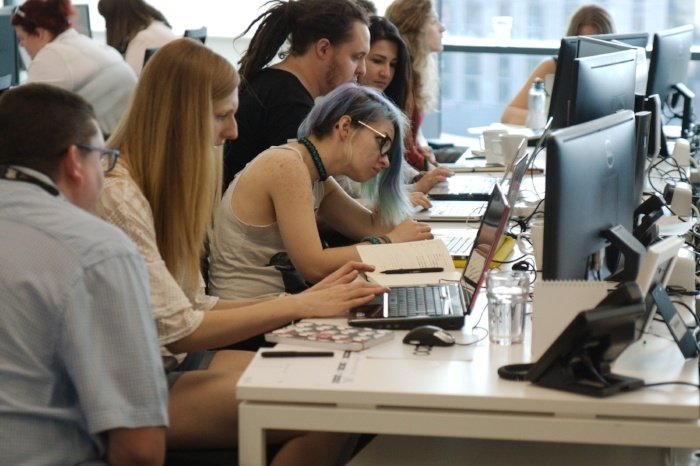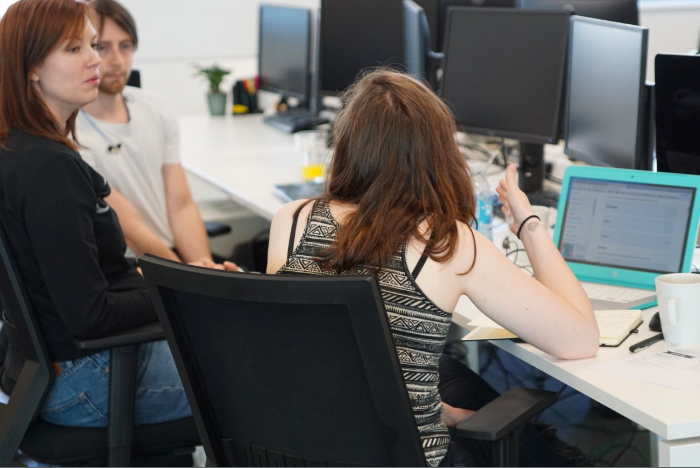Four coding myths debunked at Django Girls Sheffield

ZOO Digital recently hosted Django Girls Sheffield, a crash course in web development, with the goal of inspiring women to give the amazing world of programming a go.
Team ZOO was on hand, working with a clearly talented and motivated group during an inspiring two-day event. An event that also helped disprove a few myths about working in the tech industry.
Here are four myths that we feel need debunking today.
I need to learn the best language.
The number of programming languages out there can be daunting. There’s Python, Java, Swift, Objective-C, JavaScript, Ruby and many more.
So, what language should you learn? Which is the best?
Simple answer? There are different languages for different purposes, and no one ‘best’ language. Your choice should depend on your intended profession, the job market, how easy it is for you to learn, what practical projects you can build… and, fundamentally, what works for you.
So, when it comes to choosing, there’s no shortage of options, but the key is finding what feels right and sticking at it.
Regardless what you opt for, remember the famous words of the creator of C++, Bjarne Stroustrup:
“There are only two kinds of programming languages: those people always bitch about and those nobody uses.”
I don’t want to be a lone wolf.
Negative stereotypes can do a lot to damage the reputation of the tech industry – for some, conjuring up an image of antisocial developers spending hours at a glaring computer screen. But is programming really a lone-wolf profession?
It’ll come as no surprise to the attendees of Django Girls Sheffield that software engineering is collaborative and really brings people together. And nowhere is that truer than at ZOO where we have an entire R&D team dedicated to developing innovative technology that harnesses the power of our cloud computing for the TV and movie industry.
It’s true, it requires some serious concentration to get the job done, much like any creative profession, but there’s plenty of teamwork involved when working on a programming project and problem-solving as a team.
At the end of the day, the best software is built by people who can understand the needs of their audience; people who can work together to create something inspired.
I won’t fit into the culture.
There’s been a recent surge in TV and movies focused on the tech industry. Shows like Silicon Valley, IT Crowd and Mr Robot paint some curious pictures of techies at work. But let’s be clear, that isn’t the real world! And there’s no such thing as a typical programmer.
Software engineering and programming are lively and diverse. Django Girls Sheffield certainly demonstrated that programming attracts a wide variety of people and personalities.

In terms of gender diversity, it’s important to remember and take inspiration from timeless role models like Ada Lovelace, who was arguably the very first programmer, or Grace Hopper who, among other things, invented the compiler.
Then there’s the likes of Kathryn Parsons, founder of Decoded, who aims to demystify coding and ‘spread digital fun’. Or Juliana Rotich, executive director of Ushahidi, who has pioneered new web tools for crowdsourcing crisis information.
The role models are common and the stereotypes are outdated. It seems obvious, but as with every industry, programmers have all sorts of personalities and interests – and we hope more women like those at Django Girls will be encouraged to give programming a go.
I’ll never catch up.
Programming can be a daunting field to get into. But don’t be discouraged. Despite the pop culture portrayals of code-prodigies that ‘just get it’, like any profession, programming takes hard work and practice.
But it’s never too late to start learning.
In fact, every programmer is learning continuously. As new tools become available and different systems get tweaked and updated, everyone is catching up. You don’t have to search far for inspirational stories of professionals pivoting into programming.
Django Girls does a great job of highlighting attendees who go on to become professional developers after dipping their feet in the water.
For example, Amanda Tjernlund was inspired by a Django Girls event last year. Following the workshop, Amanda then spent three months learning JavaScript at an intensive full stack course. She soon went on to get her first development job.
Amanda said:
“It was an incredibly rewarding, difficult, intense year and I’m glad I didn’t give up those times I was tempted to.
“Working as a junior developer without a computer science degree in a tech team of only men, I have to admit I still have a severe case of imposter syndrome. But I keep reminding myself that in software development you never stop learning. Even senior developers have to pick up new things daily.”
Get involved!
Django Girls Sheffield was a fantastic success, not just for bringing people together and piquing interest in web development, but also for demystifying the tech industry.
We hope the event helped to address practical challenges like choosing a first coding language and remove any doubts around tech culture.
It’s crucial that companies like ours, built on cutting-edge software and innovation, open the door to bright, talented technologists into the profession irrespective of gender.
Myths that act as barriers to entry need debunking and we welcome the efforts of organizations like Django Girls who go the extra mile to help us do it.